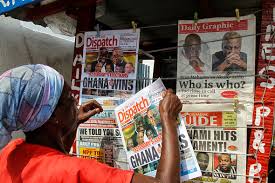The signing of an interim Trade Partnership Agreement between Ghana and the United Kingdom (UK) to sustain trade relations and the delivery of the 2020 presidential election petition by the Supreme Court today are some of the trending stories in the Ghanaian press on Thursday.
The Graphic reports that the Ghanaian government has signed an interim Trade Partnership Agreement (TPA) with the United Kingdom (UK) to sustain trade relations between the two countries as Britain and Northern Ireland exit the European Union (EU).
The agreement, which allows up to £1.2 billion worth of trade between the two sides, replaces the interim Ghana-EU Economic Partnership Agreement (EPA), which governed trade relations between Ghana, but ceased to apply to the UK on December 31, 2020.
The new trade framework provides duty-free-quota access for Ghanaian exports to the UK market and enhances the competitiveness of local industries. It would also improve the business environment in Ghana through development cooperation between the two countries.
Negotiations between the technical teams of both nations for the new trade framework started in March 2018, with the two countries arriving at a consensus on the fundamental elements of the new agreement.
Ghana’s Acting High Commissioner to the UK, Mr. Peprah Ampratwum, signed on behalf of the government, while the UK Secretary of State for International Trade, Ms Liz Truss, signed on behalf of the UK last Tuesday.
The newspaper says that some experts have expressed optimism that economic activities in the country will rebound faster than initially anticipated as more people take the COVID-19 vaccine.
The economic analysts told the Daily Graphic in an interview yesterday that the vaccine rollout would boost the confidence of businesses and consumers to carry out their activities as they explore new business avenues for a faster recovery of the economy.
A professor of Economics, Professor Peter Quartey, and an Economist, Dr. Said Boakye, said it would also boost the confidence of business partners abroad to open up or increase trade to the country.
Consequently, they expect the government to set economic growth for this year to between 4.5 and five per cent on the back of the positive impact of the vaccine rollout on gross domestic product (GDP) growth.
The experts were speaking to the paper on the impact of the national and the global COVID-19 vaccination exercise, on the domestic economy which suffered its first depression in more than three decades last year on the back of the COVID-19 shock in the country.
The first phase of the vaccination exercise which started last Tuesday, is expected to end on March 15, 2021, within which period about 600,000 people in 45 districts in three regions in the country would have been covered.
The beneficiaries are expected to take their second mandatory doses between eight and 12 weeks, according to a guideline issued jointly by the Ministry of Health and the Ghana Health Service (GHS).
The Graphic also reports that the 2020 presidential election petition will reach a climax today when the Supreme Court delivers its judgment.
It is expected to be a judgment that will either affirm or shoot down the Electoral Commission (EC’s) declaration of President Nana Addo Dankwa Akufo-Addo as the winner of the December 7, 2020 presidential election and the constitutionally elected President of the Republic of Ghana.
Depending on how the judgment goes, Ghanaians will also know whether or not the seven-member panel of the apex court, presided over by the Chief Justice, Justice Anin Yeboah, will grant the main thing the petitioner — former President John Dramani Mahama — is seeking, which is for the court to order the EC (first respondent) to conduct a run-off between him (Mahama) and President Akufo-Addo (second respondent).
The Chief Justice will be joined by the other panel members – Justices Yaw Appau, Samuel K. Marful-Sau, Nene Amegatcher, Professor Nii Ashie Kotey, Mariama Owusu and Gertrude Torkornoo, in pronouncing the court’s decision.
The Times says that the Economic Community for West Africa States (ECOWAS) Commission has been urged to pay particular attention to issues related to the expansion of agriculture and agribusiness in the development of its Vision 2050.
In a communique dubbed “Kyebi Declaration”, participants in a consultative meeting for traditional and religious leaders on the vision said that the sector had great potential to provide employment for the youth and ensure food security.
“These efforts should take into account the importance of the livestock sub-sector for the rural areas and lead to mechanisms for the prevention and resolution of conflicts between herders and farmers,” it said.
The ECOWAS Commission held a consultative meeting on the community vision at Kyebiin the Eastern Region, from 25 to 26 February 2021.
The meeting was to take note of the achievements, challenges and the opportunities that exist for effective collaboration with traditional and religious leaders.
The communique, however, stressed the need for ECOWAS Commission to pay greater attention to education and health issues in order not to exclude anyone from the fight against poverty.
“To this end, vulnerable groups, including the handicapped, children and women, must be prioritised as well as the issue of employability of young people,” it added.
The participants were convinced that improving governance and fighting corruption would increase the impact and quality of member States’ development efforts.
“We add to these governance issues the need to improve the implementation of already-adopted community policies,” it said.
GIK/APA


